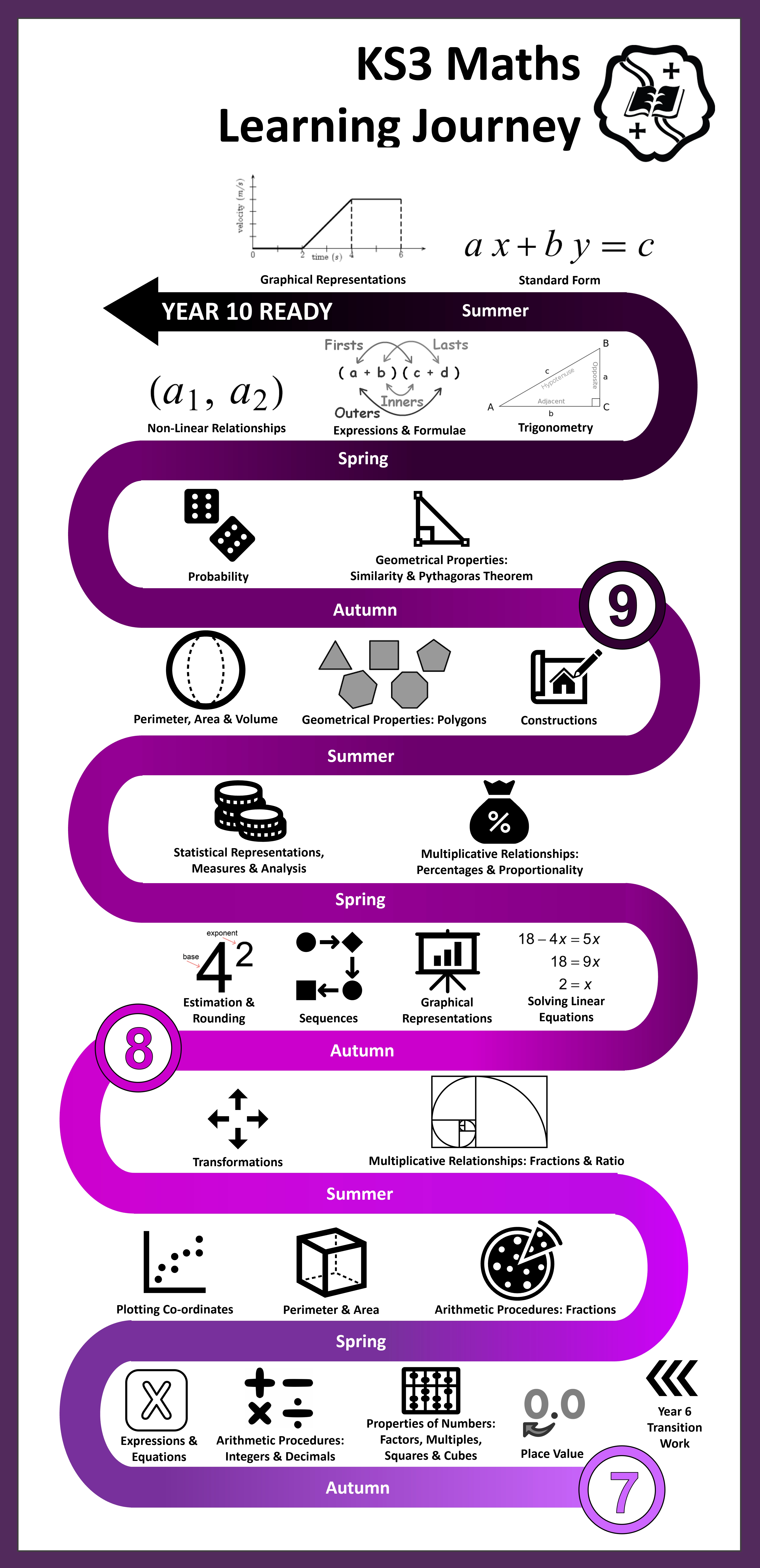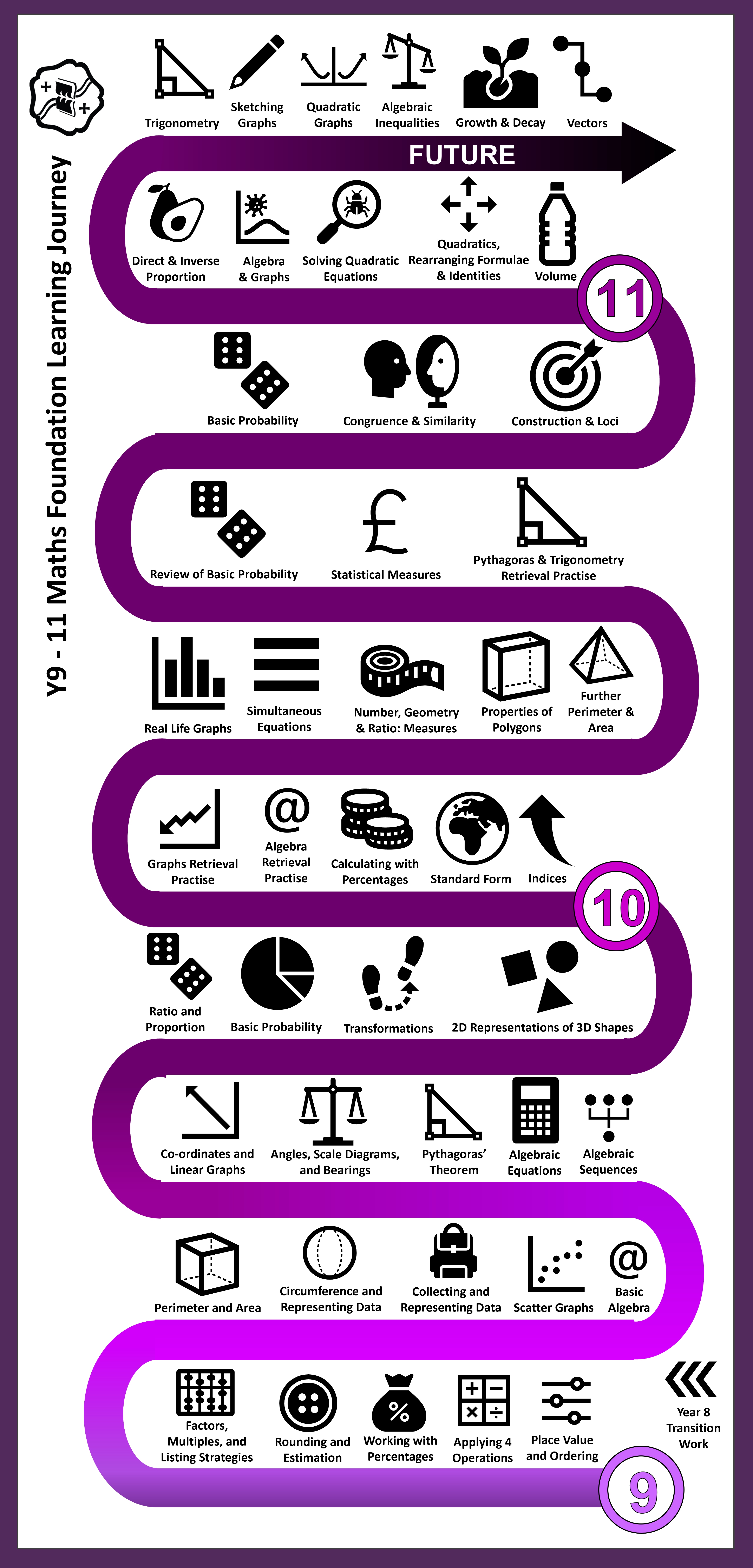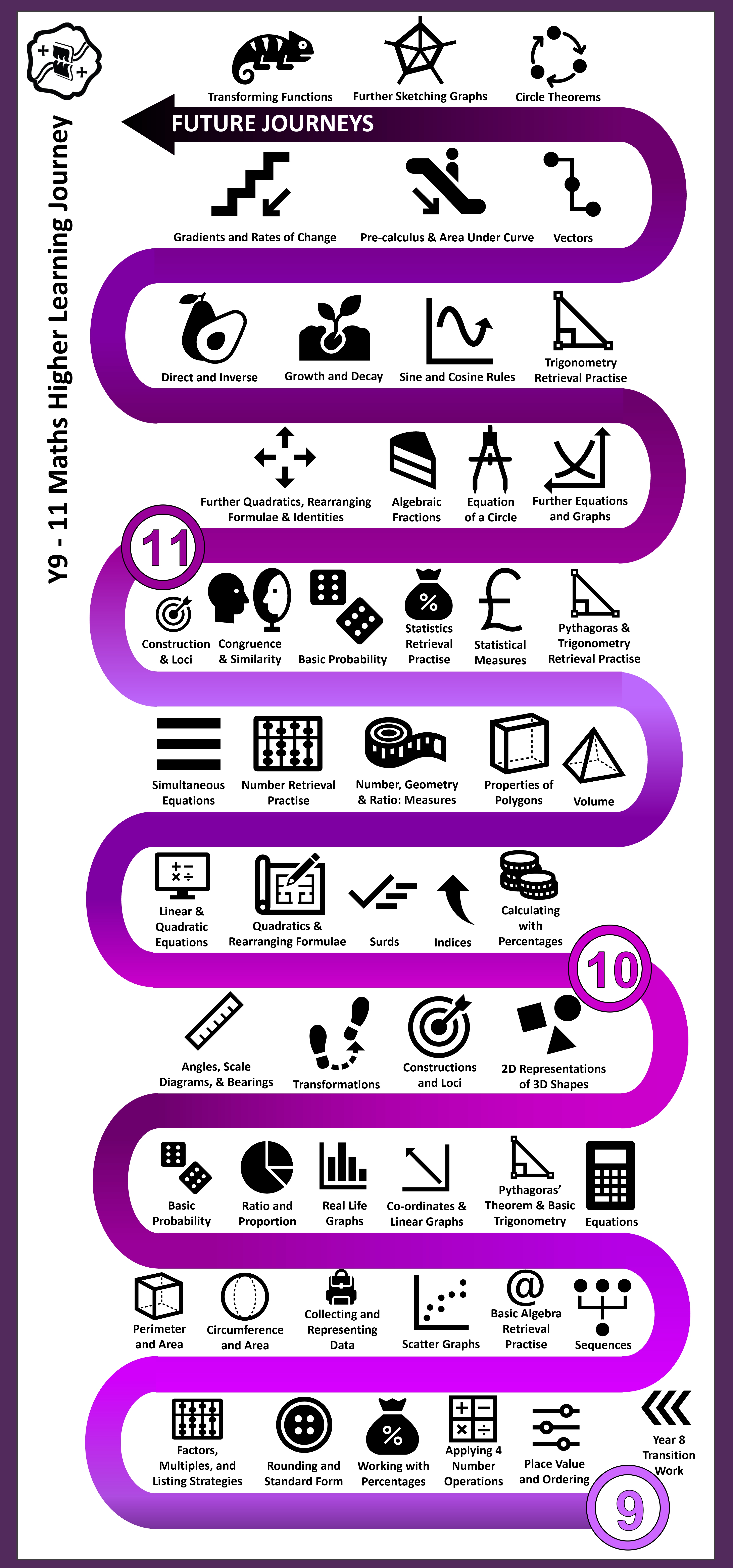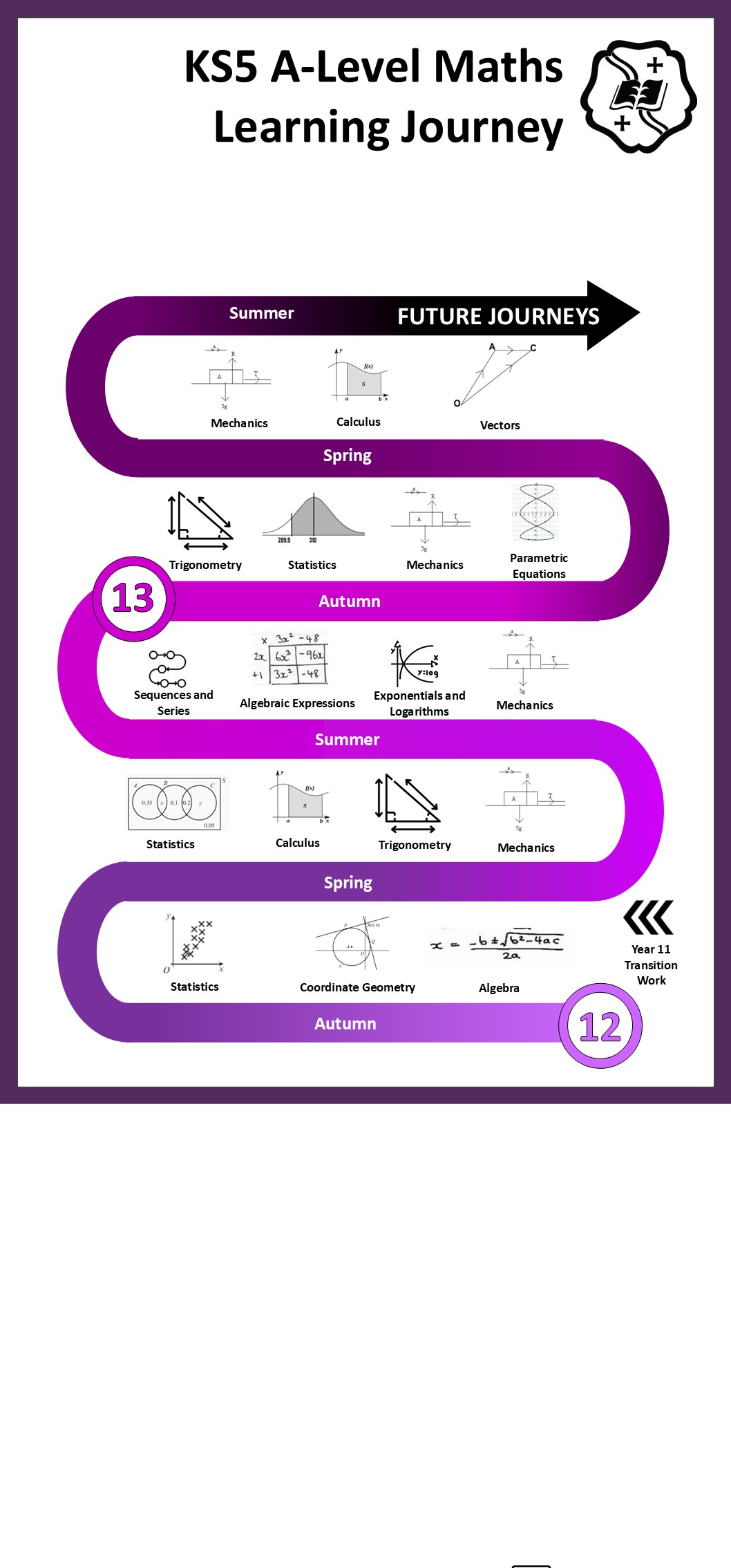We believe that everyone can succeed in mathematics and our aim is for
all students to develop their confidence in maths and share in our passion for
the subject. At the heart of mathematics is solving problems. We aim to foster
students ability to think mathematically and develop their ability to reason
and problem solve.
Our scheme of work is based on a model of progression which enables students to develop their ability to use and apply mathematics which will empower them to see the value of mathematics beyond the classroom. A nurturing environment will build confidence in budding mathematicians, who reflect on their own learning, develop independence, problem solving and reasoning skills. Our students are grouped by prior attainment to meet all their needs.

GCSE (9 – 1) Mathematics is a challenging course which develops upon the progressions students have made throughout Key Stage 3. As with Key Stage 3 students will study topics in Number, Algebra, Ratio, Proportion and Rates of Change, Geometry and Measures, Probability and Statistics. Our GCSE course will focus on develop students problem solving and mathematical reasoning skills. Students will be set by prior attainment and progress will be closely monitored during the two year GCSE course to ensure students are placed in the right set to suit their needs. There are two tiers of entry at GCSE (9 – 1) Mathematics, Higher tier which covers grades 9 – 4 and Foundation tier which covers grades 5 – 1. The decision on which tier of entry will be based on students prior attainment and will be chosen to ensure the best possible outcome for each individual student.
Exam Board: Edexcel
Qualification Title: Mathematics
Qualification Specification Code: 1MA1
Qualification Webpage: Click here to visit the Edexcel webpage for the specification.
Studying GCSE(9-1) Mathematics will enable you to:
• Develop fluent knowledge, skills and understanding of mathematical methods and concepts.
• Acquire, select and apply mathematical techniques to solve problems
• Reason mathematically, make deductions and inferences and draw conclusions
• Comprehend, interpret and communicate mathematical information in a variety of forms appropriate to the information and context.
Skills you will need or required to develop include:
• Resilience, be willing to give everything a go, not be scared to get things wrong and to be stuck, it means you are learning.
• Be willing to practice what you have learnt, you need to spend time practicing skills to be able to apply them to challenging problems.
• Be able to break problems down into smaller pieces to enable you to apply things you already know to unfamiliar contexts.
• Be able to spot patterns and then use what you have learnt to generalise a situation and apply it to solve a problem.


GCSE (9-1) Mathematics is assessed through three equally weighted written examinations at either Foundation or Higher tier sat at the end of Year 11.
Students must take all three papers at either Foundation or Higher tier.
Each paper is 1 hour 30 minutes long and is out of 80 marks.
Paper 1 is a Non-Calculator paper.
Paper 2 and 3 are Calculator papers.
Each paper will assess a range of different topics studied across the whole GCSE course that are unknown prior to the examination. Some topics will appear on both Non-Calculator and Calculator papers and could be assessed in more than one of the three papers.
Foundation Tier covers grades 1 – 5.
Higher Tier covers grades 4 – 9.
The final grade will be awarded on the nine-grade scale from 9 to 1 using the total mark achieved across all three papers. Individual papers are not graded.
Mathematics offers a huge variety of career opportunities, some examples of possible career paths include:
Accountancy and Professional Service
Actuarial Profession
Banking – Investment/Retail
Computing and IT
Engineering
General Management
Operational Research
Statistical Research
Teaching
Economics
Architect
Meteorologist
This course will develop knowledge and skills to help model and solve complex mathematical situations. It gives insight into how mathematical models predict and explain the world around us. It builds on the understanding and problem solving techniques established at Higher GCSE, including Algebraic Manipulation and Trigonometry, as well as introducing new areas of Mathematics such as Calculus. The content of this course is two thirds Pure Mathematics (two exams) and one third Statistics and Mechanics in equal proportions (one exam). The Mechanics element of the A level pairs well with Physics A Level, however, this is not a requirement for the course. Students will be required to have a calculator more advanced than the GCSE Scientific Calculator. Purchasing these will be organised through the school at a discounted rate when the course commences in September. A Level Mathematics is held in high regard. It is a challenging subject that continually builds on prior knowledge, introducing new content and deepening understanding in order to solve complex problems. A solid understanding of the GCSE algebra content is key to success in this subject and this is tested via an algebra test that is sat at the beginning of the course. We provide transition work that helps students prepare for this. There is an expectation throughout the A Level Mathematics course that students work outside of lessons consolidating understanding and ensuring that full corrections are completed for all home studies and assessments. To help with this we offer additional support sessions three times a week and extra timetabled lessons as required.
The foundations of the Key Stage 5 curriculum are to enable students to successfully transition from Key Stage 4 to the challenge of A-Level and Further Mathematics. Students will continue to develop resilience and independence enabling them to overcome challenges as they deepen their mathematical knowledge.
The curriculum is sequenced in a way so that student’s draw on prior knowledge. Links are consistently made between Pure and Applied content to enable students to see the bigger picture to develop them to be more cohesive mathematical thinkers.
Students will be supported in developing their ability to supplement the learning which takes place in lessons with private study to consolidate their understanding. This will enable students to be prepared in their future study/employment post sixth form.
Exam Board: Edexcel
Qualification Title: Mathematics
Qualification Specification Code: 9371
Qualification Webpage: Click here to visit the Edexcel webpage for the specification.
Standard Sixth Form entry requirements, plus minimum Mathematics GCSE grade 6 or above but preferably grade 7 or above

Mathematics, Science and Technology based degrees,
Architecture, Engineering, Finance, Medical degrees, Computing, Law, Economics,
Business and Management. Research
has found that having an A Level in Mathematics makes the biggest difference to
the offer you’ll receive from a top university, even if it’s not required for
the course you’ve applied for. This course will provide students with
key employability skills such as problem-solving, logical reasoning,
communication and resilience. We aim to support the development of confident,
independent thinkers who are determined and relentless in their efforts and
therefore work highly efficiently and effectively. This A Level is a versatile
qualification that is well respected by employers and provides excellent
preparation for a wide range of University courses.
Mr Cooper
Owned by: MDS | Last Published: 20/09/2019 09:53:36 | Next Update: N/A